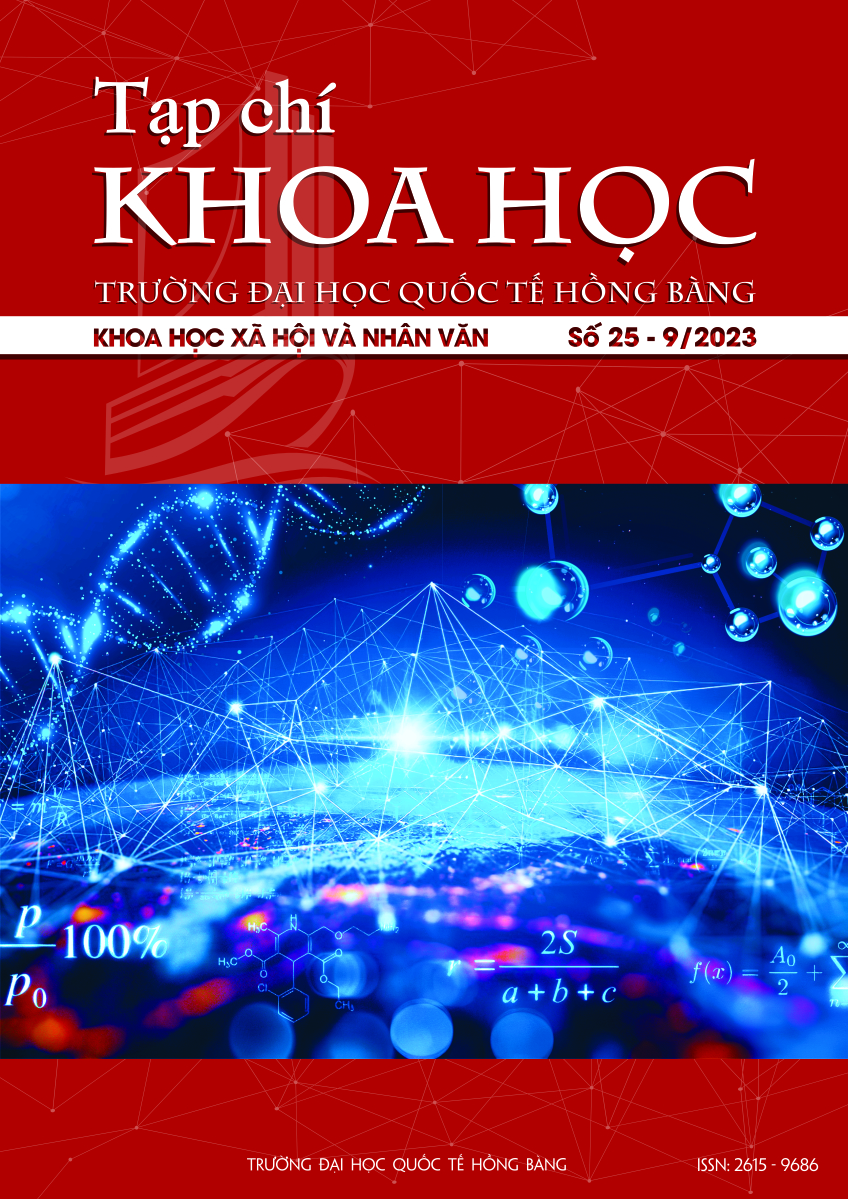Thực trạng ứng dụng công nghệ thông tin của giáo viên mầm non trong xu hướng chuyển đổi số: Nghiên cứu ở một số trường mầm non tỉnh Thanh Hóa
Các tác giả
DOI: https://doi.org/10.59294/HIUJS.25.2023.502Từ khóa:
Năng lực của giáo viên mầm non, công nghệ thông tin, chuyển đổi số, giáo viên mầm nonTóm tắt
Chuyển đổi số trong giáo dục là nhiệm vụ quan trọng của chương trình chuyển đổi số quốc gia đến năm 2025 định hướng đến năm 2030. Một trong những yếu tố quyết định đến quá trình chuyển đổi số trong giáo dục mầm non (GDMN) là năng lực ứng dụng công nghệ thông tin (CNTT) của giáo viên. Mục đích của bài viết này là nghiên cứu thực trạng năng lực ứng dụng công nghệ thông tin của GVMN để đáp ứng với công cuộc chuyển đổi số ở bậc học mầm non hiện nay. Sử dụng phương pháp nghiên cứu hỗn hợp, kết hợp giữa điều tra bằng phiếu hỏi và quan sát, phỏng vấn 205 giáo viên ở 20 trường mầm non thuộc nhiều khu vực khác nhau ở tỉnh Thanh Hóa. Kết quả cho thấy GVMN đã nhận thức tốt về vai trò của công nghệ thông tin trong xu hướng chuyển đổi số trong giáo dục. Bên cạnh đó, họ cũng gặp một số khó khăn trong việc ứng dụng CNTT đáp ứng công cuộc chuyển đổi số. Kết quả này là một cơ sở để định hướng trong công tác đào tạo ở trường đại học nhằm bồi dưỡng năng lực ứng dụng công nghệ thông tin cho GVMN đáp ứng mục tiêu chuyển đổi trong GDMN hiện nay.
Abstract
Digital transformation in education is an important task of the national digital transformation program to 2025 with a vision for 2030. One of the major deciding factors in the digital transformation in early childhood education is the ability of teachers to apply information technology. The purpose of this article is to study the current situation of preschool teachers' information technology application capacity to respond to the digital transformation in preschool nowadays. Using a mixed research method combining survey by questionnaire and observation, interviewing 205 teachers in 20 preschools in different areas in Thanh Hoa province. The results show that preschool teachers are well aware of the role of information technology in the trend of digital transformation in education. Besides, they also face some difficulties in applying IT to meet the needs of digital transformation. This result is one of the foundations for orientation in training at universities to improve the ability to apply information technology for preschool teachers to meet the transformation goal in early childhood education.
Tài liệu tham khảo
[1] Nguyễn Minh Triết, Phạm Duy Hoàng, The Impact of Digital Transformation in Higher Education: The Case Study from Vietnam, Journal of Higher Education Theory & Practice, 23(5), p. 10, 2023.
[2] Povejsil, E., INDUSTRY INSIGHTS, in https://collegiseducation.com/news/technology/higher-education-digital-transformation/. 2021.
[3] Bence, B., T. Judit, and T. Zsolt, Digital Transformation in Education during COVID-19: A Case Study. 2020, IEEE.
[4] Lê Thị Mỹ Tánh, Trần Viết Nhi, “Thực trạng tích hợp giáo dục công nghệ cho trẻ mẫu giáo trên đại bàn thành phố Huế, tỉnh Thừa Thiên Huế”. Đại học Sư phạm Hà Nội, 67(4A), p. 81-90, 2020.
[5] Trần Viết Nhi, et al., “Sử dụng công nghệ trong lớp học mầm non: Quan điểm của giáo viên ở khu vự miền trung và Tây nguyên”. Đại học Sư phạm Hà Nội, 67(4A), p. 72-80, 2022.
[6] Sarika Kewalramani, Lorna Arnott, and M. Dardanou, "Technology-integrated pedagogical practices: a look into evidence-based teaching and coherent learning for young children", European Early Childhood Education Research Journal, p. 163-166, 2020.
[7] Wenwei Luo, et al., "Are early childhood teachers ready for digital transformation of instruction in Mainland China? A systematic literature review", Children and Youth Services Review, 120, 2020.
[8] Lena Hollenstein, Stefanie Thurnheer, and F. Vogt, “Problem Solving and Digital Transformation: Acquiring Skills through Pretend Play in Kindergarten”, Education Science, 20(2), 2022.
[9] Wenwei Luo, Ilene R. Berson, and M.J. Berson, “A Social Media Analysis of the Experiences of Chinese Early Childhood Educators and Families with Young Children during COVID-19”, Sustainable Early Childhood Education for the Sustainable, 15(3), 2023.
[10] Nor, A.R., et al., “Systematic review on digital transformation among teachers in public schools”, International Journal of Evaluation and Research in Education, 2022.
[11] Noga Magen-Nagar and E. Firstater, “The Obstacles to ICT Implementation in the Kindergarten Environment: Kindergarten Teachers' Beliefs”, Journal of Research in Childhood Education, 33(2), 2019.
[12] Hồ Sỹ Hùng, D. Pandey, “Developing the Professional Capacity of Preschool Teachers in Mountainous Areas to Meet the Requirements of Augmented Education Innovation 4.0”, Augmented Human Research, 6(1), 2021.
[13] Bồ GD & ĐT, Thông tư Quy định Chuẩn nghề nghiệp giáo viên mầm non, 26/2018/TT-BGDĐT. 2018.
[14] Le, p., Digital transformation in education: advantages and challenges in 2023, in https://magenest.com/en/digital-transformation-in-education/. 2023.
[15] Hye In Jeong and Y. Kim, “The acceptance of computer technology by teachers in early childhood education”, Interactive Learning Environments, 25(4), p. 496-512, 2017.
[16] Feng Wang, et al., “Applying Technology to Inquiry-Based Learning in Early Childhood Education”, Early Childhood Education Journal volume, 37, p. 381-389, 2019.
[17] Edwards, S., “Digital play in the early years: a contextual response to the problem of integrating technologies and play-based pedagogies in the early childhood curriculum”, European Early Childhood Education Research Journal, 21(2), 2013.
Tải xuống
Tải xuống: 1202











